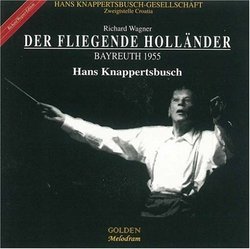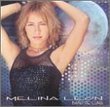| All Artists: Hans Knappertsbusch, Hermann Uhde, Astrid Varnay, Ludwig Weber, Wolfgang Windgassen Title: Wagner: Der Fliegende Hollander (Flying Dutchman) / Knappertsbusch, Uhde, Varnay, Windgassen, et al Members Wishing: 0 Total Copies: 0 Label: Melodram Release Date: 4/20/1999 Genre: Classical Style: Opera & Classical Vocal Number of Discs: 2 SwapaCD Credits: 2 UPC: 608974102821 |
Search - Hans Knappertsbusch, Hermann Uhde, Astrid Varnay :: Wagner: Der Fliegende Hollander (Flying Dutchman) / Knappertsbusch, Uhde, Varnay, Windgassen, et al
 | Hans Knappertsbusch, Hermann Uhde, Astrid Varnay Wagner: Der Fliegende Hollander (Flying Dutchman) / Knappertsbusch, Uhde, Varnay, Windgassen, et al Genre: Classical
|
Larger Image |
CD DetailsSimilar CDs
|
CD ReviewsAll-star athletic singing-acting cast, great teamwork 08/18/1999 (5 out of 5 stars) "This is one of those fantasy recordings with perfect casting. Every singer in the cast was absolutely in his/her prime vocally (with the exception of Ludwig Weber who was in his longevity years. But they were good years for him, and what better time to sing Daland? Windgassen was in really "in the role" with a connected, full-sailed, heroic sound.) Every singer in the cast was fully comfortable with his/her role but still emotionally invested in it--Josef Traxel and Elizabeth Schartel, no less than Astrid Varnay and Hermann Uhde, let themselves go without losing control. This is the best performance by Hermann Uhde in any role I've ever heard, although his Rheingold Wotan (Keilberth, 1952) and Telramund are almost as good. Unlike George London, who tends to overawe and unlike Fischer-Dieskau, who tends to whine, Hermann Uhde manages to be forceful without losing sympathy for his suffering. I wish someone would release one of his performances of Amfortas. Astrid Varnay audibly had to hold back her white-hot vocal steel to keep poor fragile Senta from overwhelming everyone. She could have done anything that night.Knappertsbusch conducted thoughtfully, with respect for the drama. Some of the choral numbers seemed slow but most of the time he remembered that it's not PARSIFAL and kept it moving. Strong, mutually-resonsive ensemble singing by the soloists makes this a standard-setting performance for me." A great event well-preserved Webster Forrest | London United Kingdom | 02/08/2002 (4 out of 5 stars) "I bought this recording for Astrid Varnay's Senta and the conducting of Hans Knappertsbusch. Both lived up to my expectations. I don't know of another recording of the Dutchman conducted by Knappertsbusch, and the only other readily-available source of Varnay in this role is an issue on Teldec from the same season at Bayreuth, with similar same cast and under Josef Keilberth. Given the choice, I'd take the present recording, though it is not without its faults. Knappertsbusch's conducting is very different from most Wagner interpreters we hear on record. During his lifetime he was sometimes considered a genius and sometimes an old-fashioned bore. Generally he takes much slower tempi than other conductors, and quite often his performances are a bit messy. In this case, he brings new and ingenious insights to the drama through his broad tempi and insightful mastery of the score. For those not used to his conducting but familiar with the opera, this recording may sound all wrong. It may seem far too slow sometimes - especially in comparison to other versions - but in my opinion what he does is wonderful. For those familiar with and appreciative of Knappertsbusch, this recording will certainly raise a smile of respect and pleasure at the greatness of his approach. It's definitely worth listening to just to see aspects of the music which are usually hidden. Astrid Varnay was one of the great Wagner sopranos of the past century. Her prominence at Bayreuth from its first opening after the war is noteworthy: for a decade she was the star soprano of that festival, and her recordings of Brunnhilde from that period are cherished by record collectors. Her approach to the role of Senta is characteristically insightful, and she gives some of the most beautiful singing I've ever heard in this role. It is not a role with the depth of character of Brunnhilde or even Isolde, but her approach to this role is just as thorough. Some could criticise for a certain holding back vocally, but not me. She delivers shining high notes, meaningfully declaimed texts, and technical skill of an extremely high level. Hermann Uhde is quite good dramatically in a lot of passages, and his singing is *more* in tune in this recording than elsewhere, but he is severely out of time with the orchestra for a great deal of the opera. Knappertsbusch does a good job (uncharacteristically) of pulling the divergent forces of singer and orchestra together, but Uhde gets so lost that it requires a lot of jumping around for the conductor to get control. In his duet with Senta he is all over the map and Varnay is the only thing holding it together. Altogether though, his performance is noteworthy for an impeccable dramatic intent and his fantastic voice. Now if fate had given us Hans Hotter in this role instead, THAT would have made it priceless.Wolfgang Windgassen can be heard in particularly good voice in the role of Erik. He sings this role with beauty and real feeling - something rarely heard among Eriks (or Windgassens). Ludwig Weber is a wayward and crude Daland. He is terribly out of time with the orchestra, and is never particularly close to the note. I find nothing whatsoever to recommend in his performance on this disk. Josef Traxel - with resonant voice, accurate and charmingly youthful singing, and clear tone - is the saving grace of their scenes together in Act I. So for those seeking to hear the Senta of one of Bayreuth's greatest singers of the past, and for those who want to hear perhaps its greatest conductor, this recording offers a glimpse of their great skill and artistry. For those who want an all-round recording of the Flying Dutchman, and who want to enjoy the whole opera from beginning to end, other recordings might be a more suitable choice. Karajan's studio recording of this opera .... or the Bayreuth recording with Thomas Stewart and Gwyneth Jones conducted by Böhm are excellent. The sound quality of this recording is of a very high standard for a live recording from 1955. Apart from it being mono, there is nothing about the sound which should bother any listener focussed on the work. The different parts of the orchestra as well as the words and voices of the singers are heard very clearly and there is little distortion or background noise. The opera is performed as one act (i.e. three acts without a break or intermission), and takes two disks. A note for the hesitant: this is a Bayreuth recording which may be forced out of the catalogue by the greedy Bayreuth administration, so I would get it while it's available. The same fate has befallen many of Bayreuth's finest recordings over the past few years, most notably the 1953 Krauss Ring, which also featured the astonishing Astrid Varnay. I hope you enjoy it!" An inspired performance! Jim Player | Rochester, NY, USA | 07/08/2000 (5 out of 5 stars) "Probably the best Holländer on record...opening night of this prodution in Bayreuth, and the electricity can be felt even in decent mono sound 45 years later. Hermann Uhde is the most hauntingly unforgetable Dutchman since Hotter. Ludwig Weber sings with his usual superior musicianship, and Windgassen shines - it's refreshing to hear just how beautifully he could sing apart from The Ring and Tristan. Varnay is a bit cautious, but her final scene at the operas finale when she cuts loose from the back of the stage is absolutely hair-raising...I get goosebumbs just thinking about it! A great cast under the great Knappertbusch who leads with his typical broad but well paced conducting...anyones reaction will be the same as the enthusiastic audience that was present that glorious evening, responding with a thunderous ovation."
|

 Track Listings (10) - Disc #1
Track Listings (10) - Disc #1
